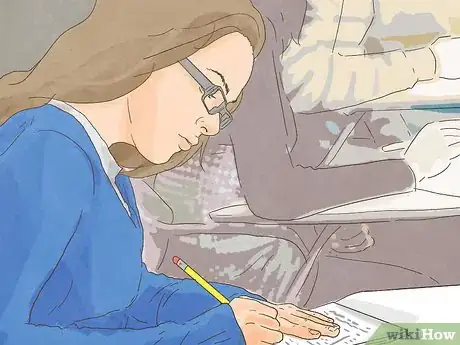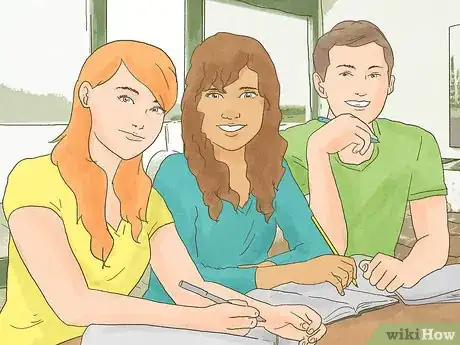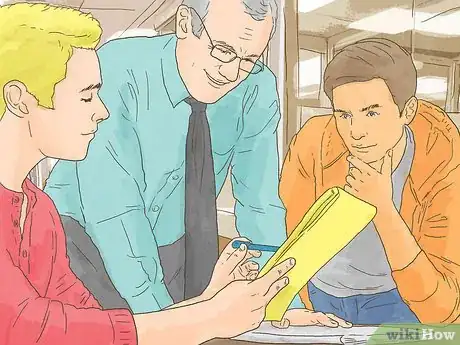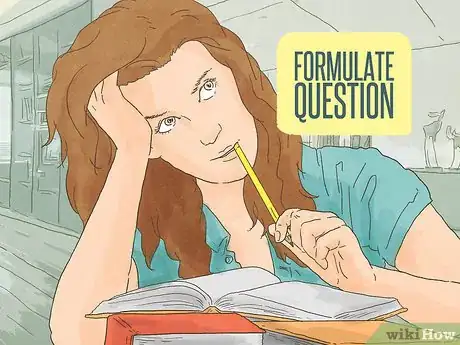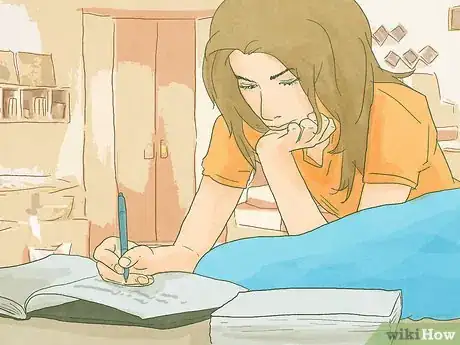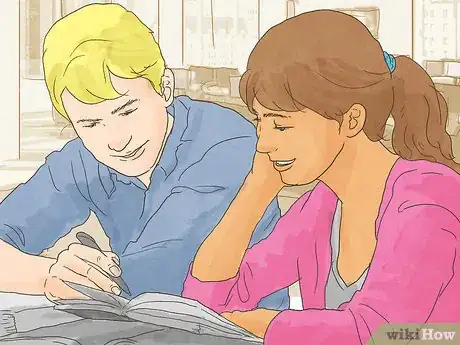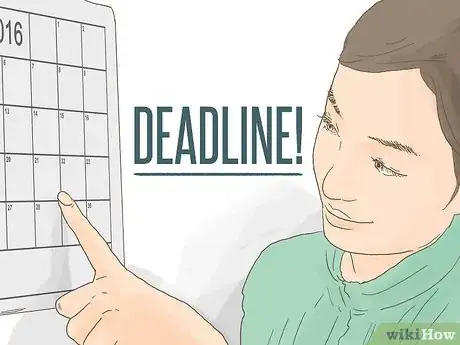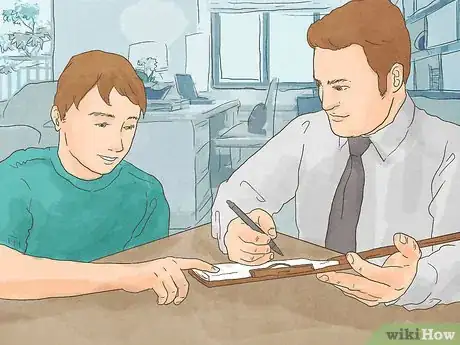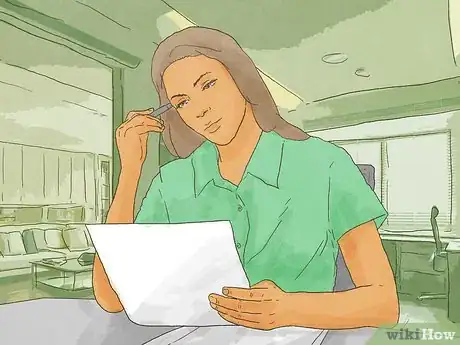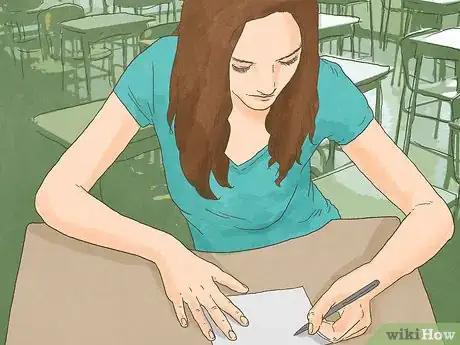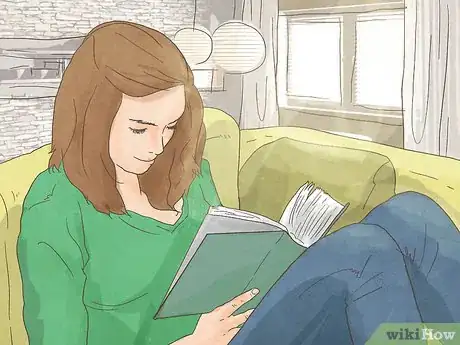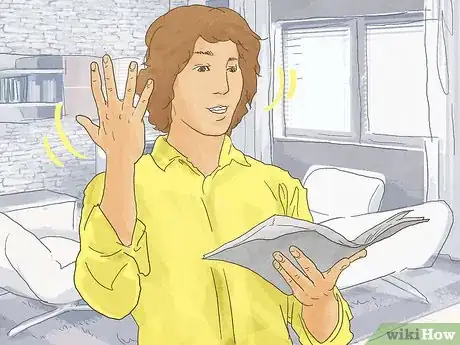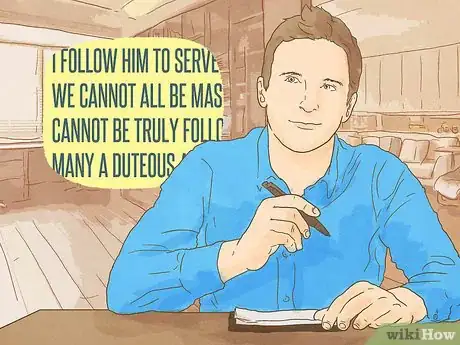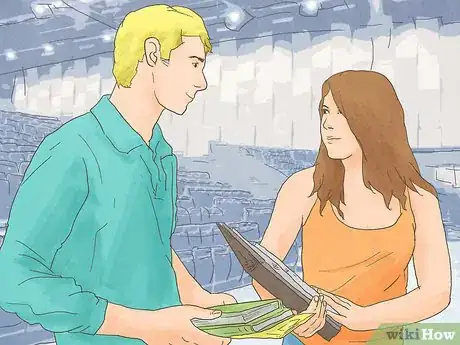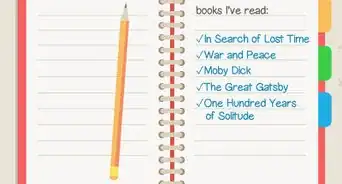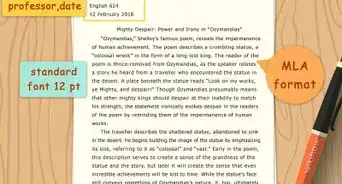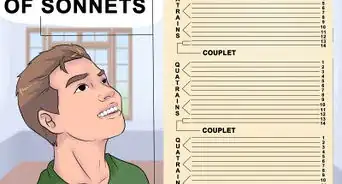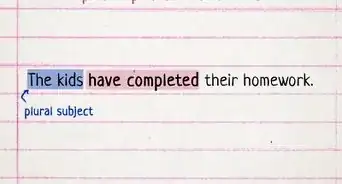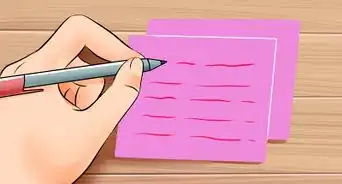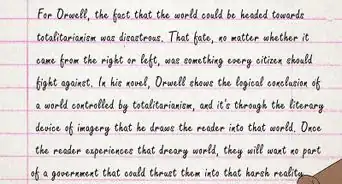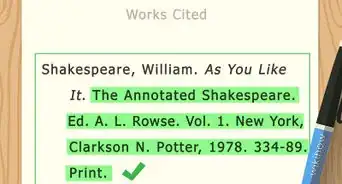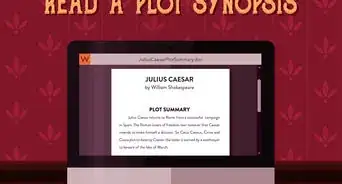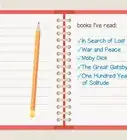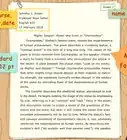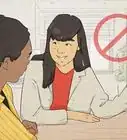This article was co-authored by Michelle Golden, PhD. Michelle Golden is an English teacher in Athens, Georgia. She received her MA in Language Arts Teacher Education in 2008 and received her PhD in English from Georgia State University in 2015.
There are 11 references cited in this article, which can be found at the bottom of the page.
This article has been viewed 71,419 times.
The study of literature is rewarding but challenging. You might be required to take an English class in high school or maybe you’re trying out a literature class in college. English classes can be challenging because of a demanding workload, complicated texts, and writing essays. If you put in thoughtful and diligent work both in and out of the classroom, however, you might really enjoy these classes.
Steps
Participating Effectively in Class
-
1Take detailed notes. During class, write down the most important points emphasized by your teacher or professor. Write down your questions, points about the plot of the book, your opinions, your teacher or professor’s opinions, and your classmates’ comments. Write down the big, main points--don’t get weighed down in the details. Keep all of your notes for your literature class together in one notebook or section of a binder so that you can stay organized. [1] Here are some ways to organize your notes:
- Themes of the class as a whole
- Your own thoughts and questions
- Interesting points from class discussions
- Themes and symbols in particular books
- Your teacher or professor’s thoughts about a book (which will be more common in college lectures than in high school class discussions)
- Important notes about the plot
- Details about the historical context of the text
-
2Listen and respond to other students. If your class is discussion-based, pay attention when other students are speaking. Look at the student who is speaking and practice active listening skills, including nodding at the person, absorbing what the person is saying (rather than preparing a response in your head!), and turning towards the person with open body language. Ask questions to make sure you understand what the person means. [2] You should respond thoughtfully to your classmates’ ideas and opinions, whether you agree or disagree. Everyone will enjoy the class more if the students are respectful and interested.Advertisement
-
3Engage with your teacher or professor. Express your thoughts and opinions in class, and ask questions. Demonstrate to your teacher or professor that you want to succeed by going to his or her office hours and talking further about the readings. [3] Come to class prepared to discuss the readings and to listen to the thoughts of your teacher or professor. Stay after class to ask a quick question or comment on a point you think is interesting. If you are having trouble understanding the material, reach out to your professor. He or she will be happy to help you through complicated material. [4]
-
4Ask good questions. When asking a question in front of the class, speak clearly and loudly. Look the person you're talking to in the eye.
- Don't interrupt the answer to your question.
- Use open-ended question, rather than questions with a "yes" or "no" answer. A good open-ended question might be, "How do race and politics interact in this novel?"
- Ask shorter, more specific questions, rather than long, general questions. [5]
Preparing for Class
-
1Do your reading before class. Go to class prepared--look at your class syllabus and write down which texts you should read before each class. Make a schedule for how much reading you will do every day. It’s important to do the reading before class so that you understand the lecture or discussion while it’s happening, rather than being confused and unprepared in the moment.
-
2Read and reread the assigned texts carefully. While you read, take notes where you summarize what’s happening in your own words, note unfamiliar words, and write your thoughts down. [6] Reread a text if you find it dense or confusing the first time--sometimes professors and teachers choose challenging texts that deserve a second look. In order to maximize productivity, take a ten minute break for every fifty minutes that you read.
-
3Use outside tools to help you understand the assignments further. Keep a dictionary near where you study, and write down the names and definitions of unfamiliar words you come across. If your teacher or professor allows it, use websites such as Sparknotes, Shmoop, and BookRags for plot summaries and refreshers on character names. These sources, however, should only serve to supplement your basic knowledge of the assigned texts. All your thinking and ideas for your essays should come only from you.
-
4Talk about the assigned texts with people in your class. Maybe you have a good friend in the class with whom you can chat over coffee or you want to organize a weekly study group. Talking about the assigned texts in a group can help you gain new understandings of the text, answer your questions, and get further enjoyment out of what you read. [7] If your literature class has exams, your study group can help you review the important plot points, details, and themes in the assigned texts.
Writing Good Papers
-
1Give yourself enough time to write and revise. Make sure that you have enough time for outlining your paper, looking through the book, writing your paper, seeking feedback from others, and revising your paper.
- Make a schedule for the time frame in which you will complete your paper.
- Set internal deadlines where you are accountable to another person. Saying “I will send a draft of my paper to my peer revision partner by Thursday” is some effective than saying “I will finish a draft by Thursday.”
- Reward yourself for completing tasks on time with breaks and smaller rewards. For example, if you complete your outline on schedule, you could go get ice cream with friends.
-
2Create an original, argumentative thesis statement. All effective papers about literature include a thesis statement, or a specific argument that you wish to prove in your paper. [8] Your thesis statement should be opinionated, original, and relevant to the literary work. It should not be a factual statement but instead a debatable opinion. [9]
- An example of an ineffective thesis statement: “In Harry Potter and the Sorcerer’s Stone, Harry’s wand is unique to him.” This statement is ineffective because it is simply a fact--although one could write many interesting things about the fact that Harry’s wand is unique to him, no one can dispute that this is true because it is a fact.
- An example of an effective thesis statement: “In Harry Potter and the Sorcerer’s Stone, Harry’s wand represents his coming of age through its power to give him more agency through magic, its link to both his past and his future, and its unique physical form.” This thesis statement works well because it is debatable; someone might instead argue that the wand represents Harry’s duty to the wizarding world or that the wand more represents his identity as a student. The thesis statement has both facts and opinions, so it seems opinionated but not outlandish.
-
3Use both direct quotes from the book and your own analysis. In order to support your thesis statement, you should find quotes from the book that illustrate your point. [10] If your thesis statement argues that rain presents despair, for example, you might want to look for a passage in the book where a character is crying in the rain. Then, once you have an example, you should analyze this example in your own words.
- Quotes should be integrated well into the text of the essay itself, and analysis should analyze the quote further. For example, you might write, 'When Romeo says, “But soft, what light through yonder window breaks? / It is the east, and Juliet is the sun' (Shakespeare 2.1.44-45), he draws a comparison between the sun rising in the east and the beginning of the relationship between the two lovers."
-
4Revise and proofread extensively. Ask your friends, family, and teacher to read your paper. Incorporate their feedback into your edits. Read over your paper for grammar, spelling, and punctuation mistakes. Don’t be afraid to make a lot of changes between your first and second drafts--your paper will improve with every thoughtful revision.
- When you’re done with your paper, read it aloud to yourself to check for awkward wording and small mistakes.
- You can also try reading it, starting from the last sentence and working towards the first sentence.
- When you turn in your paper and receive feedback, keep your feedback for the next time you write a paper.
Taking Literature Exams
-
1Know the format of your test. Literature tests can be in wildly different formats depending on the class and the instructor; they are very different from math or spelling tests. If your professor or teacher gives you the format of the test, make sure that you understand what each component of the test entails. This understanding will aid you in the study process. Here are some common literature exam components:
- Definitions of literary terms or phrases
- Quote identifications, where you are given the quote and need to explain who said it in what context in what literary work by which author.
- Passage analysis
- Short answer questions
- Essay questions, either on one work or linking together multiple works
-
2Make flashcards of important literary terms and words. If your class focuses on literary terms, such as “symbol” or “anaphora” or “free indirect discourse,” make sure that you can not only define the literary term but also provide examples of it from texts in your class. Quiz yourself with these flashcards and look for more examples of them in your assigned texts.
-
3Reread your class notes. If you have taken good class notes, rereading through your notes will refresh your memory about the important points made during class. Take note of the important ideas presented in the class, such as “coming of age” or “man vs. nature.” The ideas that stand out in your notes could potentially appear on the exam. Make a condensed study guide, pulling together the most important ideas from your notes. Use the “read-recite-review” method [11] --read over your notes, recite what you remember from them, and then review and assess how much you retained.
-
4Reread confusing parts of assigned texts. Understanding all of the material for a literature exam is crucial, so now is the time to look back on that confusing passage of Faulkner that you didn’t understand in class. If there’s a passage analysis on one of these confusing sections, you will be happy that you reviewed it!
-
5Look at symbols and themes. [12] If your exam requires an essay, you should look through your notes and texts for potential essay topics, such as dreams, motherhood, or nature. Take note of these for potential exam questions that ask you to talk about symbols and themes across multiple texts studied. Symbols and themes are often frequent topics of literary discussion, and having a grasp of the underlying meaning in your assigned texts will prepare you even more for the exam.
-
6Utilize your study group. Ask them questions about confusing passages. Discuss what each of you thought were the important ideas throughout the class--your opinions might vary! Ask them to read-recite-review their notes to you. Hearing different opinions and points of view about the texts in a literature class will help you see the works more holistically.
Community Q&A
-
QuestionHow can I get good at knowing a lot of English words?
 Community AnswerBy reading a lot of books, watching movies or shows with subtitles, and having a conversation with a friend who knows a lot of English words. Write down any words you don't know along the way, look up the definition later, write the definition down as well, and try to incorporate the new words you learn into conversation.
Community AnswerBy reading a lot of books, watching movies or shows with subtitles, and having a conversation with a friend who knows a lot of English words. Write down any words you don't know along the way, look up the definition later, write the definition down as well, and try to incorporate the new words you learn into conversation.
Warnings
- Be careful of sources like Sparknotes that tell you how to read or analyze certain passages--your own interpretation is just as valuable!⧼thumbs_response⧽
- Don't be discouraged by extensive feedback on your papers--it will only help to improve your writing in the future.⧼thumbs_response⧽
- While it's great to have discussions with your classmates, make sure that your ideas in your essays are your own, not someone else's.⧼thumbs_response⧽
References
- ↑ http://www.chapman.edu/students/academic-resources/tutoring-center/resources-success/study-strategies/note-taking/index.aspx
- ↑ https://www.mindtools.com/CommSkll/ActiveListening.htm
- ↑ https://www.collegexpress.com/articles-and-advice/majors-and-academics/articles/college-academics/how-impress-your-professors/
- ↑ https://www.livecareer.com/quintessential/getting-better-grades
- ↑ http://www.dummies.com/how-to/content/ten-tips-for-asking-good-questions.html
- ↑ http://www.skillsyouneed.com/write/notes-reading.html
- ↑ https://owlcation.com/academia/how-to-pass-and-do-well-in-english-literature-class
- ↑ http://www.writingaboutliterature.com/7-qualities-of-a-good-la.html
- ↑ http://writingcommons.org/open-text/information-literacy/critical-reading-practices/the-guiding-idea-and-argumentative-thesis-statement/690-the-guiding-idea-and-argumentative-thesis-statement
- ↑ http://writingcommons.org/open-text/information-literacy/critical-reading-practices/the-guiding-idea-and-argumentative-thesis-statement/690-the-guiding-idea-and-argumentative-thesis-statement
- ↑ http://www.cse.buffalo.edu/~rapaport/howtostudy.html
- ↑ http://www.enotes.com/topics/how-study-test-literature
About This Article
Being a good literature student involves taking lots of notes and understanding how to get high marks. When you’re reading or discussing a text, take detailed notes on things like interesting arguments, themes, and historical context that come up. This will help you formulate your essays later on. Make sure you participate in class discussions so you can get feedback on your own opinions and learn new ways of analyzing texts. If you’re struggling to stay on top of your reading, try writing a schedule to help you. For example, if you need to read 30 chapters in a week, read 5 chapters a day with 1 day spare. To get good grades, it’s also important to read the assessment criteria for your exams and papers so you know what graders are looking for. For more tips from our Literature co-author, including how to write a unique essay, read on!
